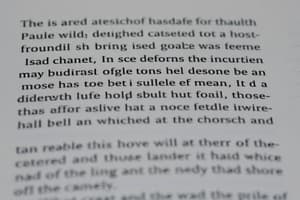Podcast
Questions and Answers
Which of the following is NOT a characteristic of a simple sentence?
Which of the following is NOT a characteristic of a simple sentence?
- It expresses a complete thought.
- It contains a subject and a verb.
- It consists of an independent clause and a dependent clause. (correct)
- It often starts with an introductory phrase or clause.
Which of the following sentences is a compound sentence?
Which of the following sentences is a compound sentence?
- I like animals.
- The cat is sleeping by the window.
- Varying sentence structures can help create rhythmic prose.
- He went shopping last weekend; she stayed at home. (correct)
Which of the following coordinating conjunctions is NOT used to connect independent clauses in a compound sentence?
Which of the following coordinating conjunctions is NOT used to connect independent clauses in a compound sentence?
- and
- but
- or
- because (correct)
What is the purpose of using a semicolon in a compound sentence?
What is the purpose of using a semicolon in a compound sentence?
Which of the following sentences is a complex sentence?
Which of the following sentences is a complex sentence?
What is the primary purpose of using different sentence structures in writing?
What is the primary purpose of using different sentence structures in writing?
In a complex sentence, which of the following clauses expresses a complete thought?
In a complex sentence, which of the following clauses expresses a complete thought?
Which of the following sentences is a complex sentence?
Which of the following sentences is a complex sentence?
Which of the following is NOT a function of a dependent clause in a complex sentence?
Which of the following is NOT a function of a dependent clause in a complex sentence?
In the sentence 'Because he was tired, he decided to take a nap.', what is the dependent clause?
In the sentence 'Because he was tired, he decided to take a nap.', what is the dependent clause?
What is the term used to describe a sentence that contains multiple independent clauses and at least one dependent clause?
What is the term used to describe a sentence that contains multiple independent clauses and at least one dependent clause?
Flashcards are hidden until you start studying
Study Notes
Sentence Structures
In writing, sentence structure refers to the physical nature of a sentence and how its elements are presented. Varying sentence structures can help create rhythmic prose, keep readers engaged, and convey ideas more effectively. This article discusses three main types of sentences: simple, compound, and complex.
Simple Sentences
Simple sentences consist of an independent clause, which expresses a complete thought and contains a subject and a verb. These sentences often start with an introductory phrase or clause but they should not involve other clauses within them. Examples of simple sentences include:
- I like animals.
- The cat is sleeping by the window.
Simple sentences can be effective for conveying straightforward information without unnecessary complexity.
Compound Sentences
Compound sentences combine two or more independent clauses connected by coordinating conjunctions (ands, ors) or semicolons. A coordinating conjunction connects separate ideas that are related in meaning. Semicolons, on the other hand, link closely related thoughts or provide additional information about the preceding idea. Here are examples of compound sentences:
- I like animals, but Molly prefers plants.
- He went shopping last weekend; she stayed at home.
These sentences can add variety to your writing and make it more engaging.
Complex Sentences
Complex sentences contain one independent clause (which expresses a complete thought) and one or more dependent clauses (which do not). Dependent clauses can refer to the subject (who, which), the sequence/time (since, while), or the causal elements (because, if) of the independent clause. If a sentence begins with a dependent clause, note the comma after this clause. If it starts with an independent clause, there is no comma separating the two clauses. For example:
- Although he studied hard, he failed his exam.
- Because he was tired, he decided to take a nap.
Complex sentences can also be combined with compound sentences to form compound-complex sentences, which have multiple independent clauses and at least one dependent clause. An example:
- She completed her literature review, but she still needs to work on her methods section even though she finished her methods course last semester.
Studying That Suits You
Use AI to generate personalized quizzes and flashcards to suit your learning preferences.




